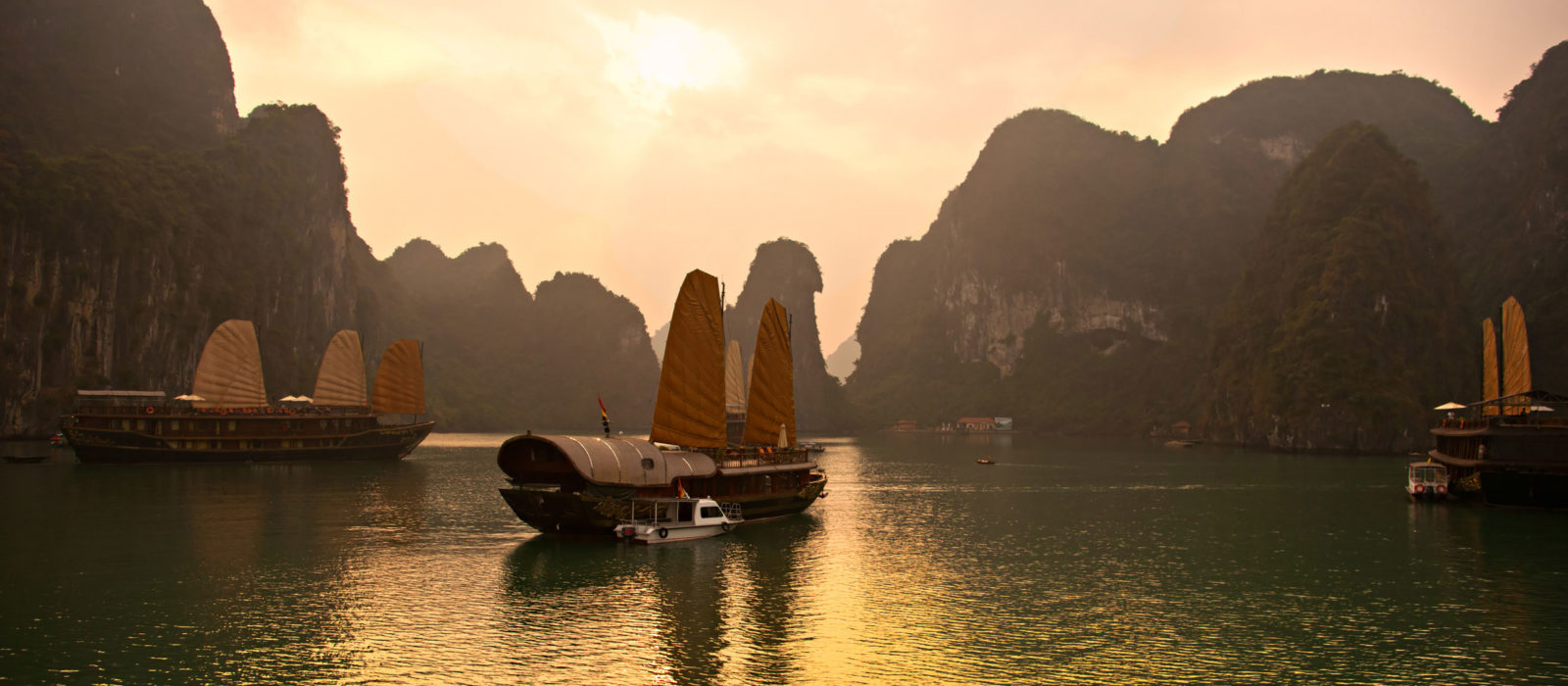Published on: October 21st, 2012
Last modified: August 3rd, 2022
We've compiled our list of most frequently asked questions to help you get prepared before your big adventure to Vietnam. Please read through the questions, using the navigation bar on the left hand side of your page to move easily between the different sections.
Please note that requirements and advice can change so we recommend you check in with your own travel insurer, doctor and relevant local embassies before embarking on your adventure.
Are there any entry requirements for Vietnam?
Visas
Yes, US, Canadian and UK citizens will need a visa and can apply for an e-visa, at USD 25 per person. This will allow single entry for up to 30 days and should be applied for at the government website: https://immigration.gov.vn/web/guest/trang-chu-ttdt
Passports
Visitors to Vietnam may be refused if their passport expires less than one month after their visa expires. In general it is recommended to travel with six months validity remaining in your passport and at least three blank pages.
We will confirm certain elements of your trip such as domestic flights, permits or train tickets using your current passport details. If a member of your party changes their name in their passport after booking (for example, through marriage or adoption) this could mean having to reissue important parts of the trip at an extra cost and subject to availability.
Please note that requirements can change and we recommend that our guests contact the local embassy in the country where you live for the most recent and up to date information.
Do I need travel insurance?
Yes, once your trip is confirmed it is essential that you take out comprehensive travel insurance to cover you in case anything unexpected happens.
We always recommend that our guests get the maximum level of coverage that you feel comfortable investing in. Read more about travel insurance for US travellers here and for travellers from other countries here.
Do I need to visit a travel doctor before my trip?
Yes, you should visit a travel doctor before your trip. Vaccines commonly recommended for travellers to South East Asia include: Tetanus, Diphtheria, Polio, Typhoid, Hepatitis A, Hepatitis B, Rabies and Meningitis.
There is low risk of Malaria throughout Vietnam so you will not likely be told to take anti-malaria medication, however we advise you to speak to your travel doctor close to your trip as this information may have changed.
What do I need to know about my regional flights?
Regional flights in Asia are similar to those in North America. They will use similar aircraft and your baggage allowance will typically be 23kgs/50lbs, although please do check the allowance on your itinerary as it depends on your route/travel class.
What will I receive from Jacada before I depart?
Travel pack
Before you head off on your adventure you will be sent a travel pack. The travel pack is full of great information and is also a beautiful keepsake. It is not necessary to travel with vouchers or confirmations on your trip but we do recommend having a printed copy of your travel itinerary to hand when you arrive into Vietnam.
Bon Voyage email
Around 2 weeks before you depart we will email you an electronic version of your travel pack including your domestic flight tickets. Once you’ve received this email your Travel Designer will reach out to arrange a time for you to talk on the phone to go over any last minute questions and talk you through the information we’ve sent over.
Do I need to bring the local currency?
Vietnamese Dong is a closed currency, so you will not be able to exchange this outside of Vietnam. However you will need Dong for most transactions so we advise you to bring USD to exchange into Dong once in Vietnam.
In all major tourist destinations credit cards are widely accepted at most hotels and established restaurants and shops. In smaller towns, at local restaurants and local markets, credit cards will likely not be accepted. Bear in mind that a surcharge usually applies for credit card purchases, typically ranging from 3-5%. Traveller’s cheques are accepted on a limited basis, and at times, not at all. We do not recommend travelling with traveller’s cheques.
Can you tell me about tipping and etiquette in Vietnam?
While tipping is not compulsory, it is greatly appreciated in Vietnam, especially in the service industry.
Tour Guide/Drivers: If you are pleased with the services provided by your tour guide and driver, then a tip for their hard work will be very much appreciated. In general, we recommend around USD 10-15 per day, per traveller for guides and USD 5-7 per day, per traveller for drivers.
Restaurants: When dining in a restaurant, a tip of 5-10% of the total bill is appreciated.
Hotels: If you stay a couple of days in the same hotel, a housekeeping tip of USD 1-2 per day is appreciated. For porters, USD 1-2 at time of service is acceptable.
Boat Cruises: For an overnight boat trip such as in Halong Bay or river cruises, the suggestion is USD 10-15 per person, per night to cover all the boat crew.
What’s the weather like and how should I pack?
The weather in Vietnam varies considerably, so what you wear is dependent on the time of year you visit and where you go. Dress standards can be more conservative outside of major cities in Vietnam. To respect this, and for your own comfort, we strongly recommend wearing modest clothing. This means clothes that cover your shoulders and knees, particularly in pagodas and religious sites. In many rural areas, women will need to wear modest clothes, even while swimming. Consider bringing a sarong, which conveniently doubles as both a cover-up and a blanket.
Summer months can be incredibly hot and sticky, so loose, lightweight and breathable clothing is essential. Short shorts, crop tops and tank tops are not considered appropriate in Vietnam. Loose, long clothing is both respectful and tends to keep you cooler in hot climates.
The south, such as Ho Chi Minh City, are warm year-round, with temperatures rarely dropping below 20°C (68°F). However, in the north, pack a light jacket, hoodie or fleece for travel to Hanoi and Halong Bay between November and March. January is typically the coldest month, when temperatures drop as low as 13°C (55°F).
Good quality, comfortable footwear is best for hiking. Paths can be uneven, rocky, slippery and muddy depending on the season, so waterproof, worn-in walking boots or shoes with good grip is recommended. A raincoat is also a good idea during the rainy season.
Should I make restaurant reservations?
We highly recommend that you make restaurant reservations in advance of your trip. Once your trip is confirmed you will be introduced to your concierge who will be able to assist you in not only making the reservations but also making recommendations based on your preferences.
What’s the transport like?
Vietnam is famous for its bikes. Moped, bicycle or motorbike, the Vietnamese love them! We would not recommend hiring motorised ones yourself but if you are interested in using one, there are day trips we can include which involve bikes so please speak to your travel designer.
How can I keep connected on my trip?
Plugs and power
For Vietnam there are three associated plug types, types A, C and F. Plug type A is the plug which has two flat parallel pins, plug type C is the plug with two round pins and plug type F has two round pins with two earth clips on the side. Vietnam operates on a 220V supply voltage and 50Hz.
Wifi and internet connection
You’ll find most of the hotels will have wifi in the cities and further out in the country. Phone signals are usually reliable, unless your trip is going to remote places out of busy tourist areas.




